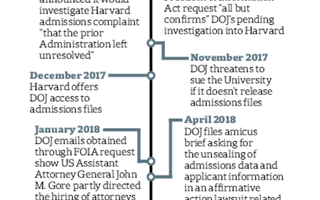{shortcode-7c0d1ceb430f391f1789361a38d3475a8d06902d}UPDATED: August 10, 2017 at 6:36 p.m.
The Justice Department’s decision to reopen an investigation into Harvard’s admissions process may result in the federal government joining an existing lawsuit on the issue, according to several legal experts.
The department last week publicly vowed to investigate allegations that Harvard discriminates against Asian Americans in its admissions process. The department’s investigation will focus on a single complaint filed in 2015 by 64 Asian-American groups that claims Harvard unfairly denied admission to qualified Asian American applicants, Justice Department spokesperson Sarah Isgur Flores said on August 2.
But three legal and affirmative action experts said they think the new investigation means the Justice Department plans to get involved in a separate lawsuit filed by the anti-affirmative action group Project on Fair Representation in 2014. Like the complaint, the lawsuit alleges that Harvard discriminates specifically against Asian-American applicants in its admissions process. The lawsuit is currently in the discovery process.
The Justice Department has multiple options if it chooses to engage in the lawsuit, according to Matthew M. Cregor, who works for the Lawyers’ Committee for Civil Rights and Economic Justice, a group that is helping to defend Harvard in court. The department could file a “statement of interest” in the case, submit an amicus brief, or file to “intervene”—request to join the suit on behalf of either the plaintiff or defendant.
The Justice Department could also sue Harvard itself, although all three legal experts reached by The Crimson said they thought that was unlikely.
Cregor said he thought the department is most likely to file a statement of interest. He said the department often uses these statements to make clear “how they think the court should interpret and apply the law.”
“The statement of interest is something they could file tomorrow without asking anybody’s permission,” Cregor said. “And given that it’s this early in litigation, it probably gets them the most flexibility in what role they decide to play in the case going forward.”
But Mishell B. Kneeland, a former Texas assistant attorney general who helped defend the university in the landmark affirmative action case Fisher v. University of Texas at Austin, said she thinks the department will be more aggressive and file to intervene in the case.
She pointed to a Justice Department memo, obtained by the New York Times, which revealed the department is seeking lawyers to staff the Harvard investigation.
“Well, since they’re actually looking for people to staff it—I don’t know that you need to send out a call for people to apply if you’re just going to do a statement of interest,” Kneeland said. “It appears to me that they would be looking to intervene.”
Justice Department spokesperson Lauren Ehrsam did not respond directly to a question asking whether the department plans to get involved with the lawsuit Wednesday. She wrote in an emailed statement that the Department “as a matter of policy” does not comment on ongoing investigations, and that “we will not be commenting further on this.”
Edward Blum, the anti-affirmative action provocateur who serves as the president of the group suing Harvard, said he has had no contact with the Justice Department concerning the case, although he would welcome their involvement.
“We would very much welcome the DOJ to intervene in the lawsuit,” he said. “There is room at the plaintiff’s table for the DOJ.”
Cregor, Kneeland, and Roger Clegg, the president of the conservative think tank Center for Equal Opportunity, said they think the Justice Department will have a heavy impact on the lawsuit, if it chooses to get involved. All three said they believed the Justice Department would intervene in favor of Students for Fair Admissions.
“It would bring the resources of the Justice Department into the lawsuit, and also the weight and the credibility of the Justice Department, too,” Clegg said. “Judges tend to pay attention to what the Justice Department says.”
Kneeland added that the department’s intervention would force Harvard to expend “significant resources” to compete with Justice Department lawyers.
As an immediate first step, the Justice Department will likely begin examining Harvard admissions data, Cregor and Kneeland said. The University was already ordered in September 2016 to submit six years of admissions data as part of the Students for Fair Admissions lawsuit.
Although on opposite sides of the issue, Blum and Cregor both see the Justice Department’s investigation of Harvard’s admissions as having wide-ranging implications—extending far beyond the University alone. Blum said he thinks this investigation will spark a departmental effort to examine admissions at “elite schools across the country.”
Cregor sees the investigation as having a more symbolic impact.
“I think it’s a shot across the bow to universities and states that are working to promote the diversity of their populace in their institutions of higher education and it’s a none-too-silent dog whistle to a fraction of Americans who want to claim reverse discrimination,” he said.
–Staff writer Mia C. Karr can be reached at mia.karr@thecrimson.com. Follow her on Twitter @miackarr.
—Staff writer Hannah Natanson can be reached at hannah.natanson@thecrimson.com. Follow her on Twitter @hannah_natanson.
Read more in College News
Social Group Ban Revives Faculty Concerns Over GovernanceRecommended Articles
-
 Justice Department to Investigate Harvard's Admissions Process
Justice Department to Investigate Harvard's Admissions Process -
 Department of Justice Threatens Lawsuit Against Harvard in Admissions Probe
Department of Justice Threatens Lawsuit Against Harvard in Admissions Probe -
 Experts Connect DOJ Probe to Harvard Admissions Lawsuit
Experts Connect DOJ Probe to Harvard Admissions Lawsuit -
 Experts Say DOJ Brief in Admissions Suit Will Have Little Impact
Experts Say DOJ Brief in Admissions Suit Will Have Little Impact -
 An Inflection Point: High Stakes as Harvard Admissions Trial Approaches
An Inflection Point: High Stakes as Harvard Admissions Trial Approaches













